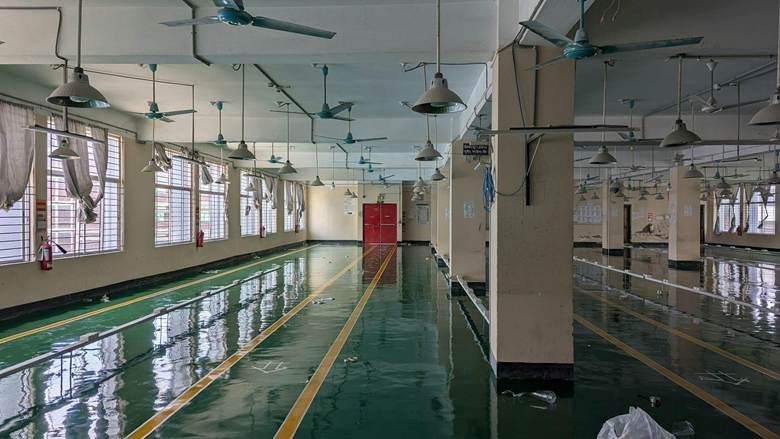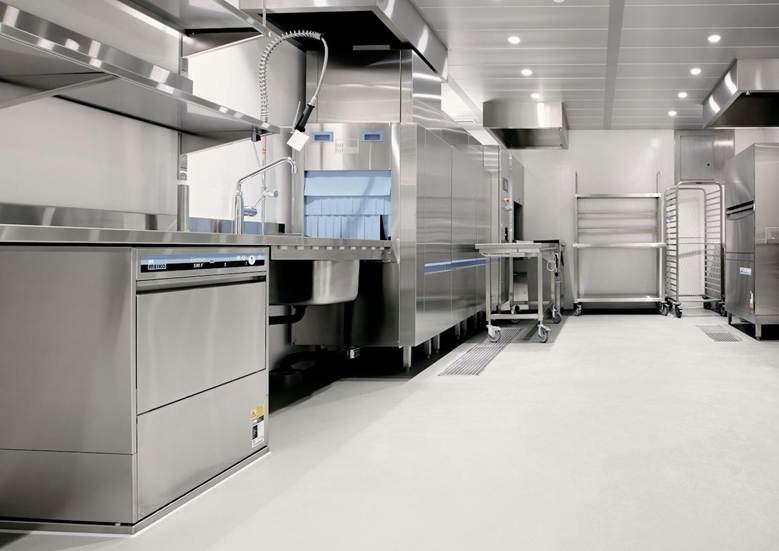Cost-effectiveness, durability, and aesthetics are crucial in determining the types of materials companies choose for their physical spaces. Flooring, often overlooked, is a foundational element that impacts everything from safety and maintenance costs to customer impressions and employee satisfaction. Epoxy flooring has seen a sharp rise in popularity across various industries, including manufacturing, healthcare, retail, and hospitality. This surge is not without reason, as epoxy flooring presents a compelling combination of long-term value, minimal upkeep, and customizable design that appeals to practical and strategic business goals. In this article, we’ll explore the key reasons why businesses are turning to epoxy flooring solutions and how these installations are proving to be a functional choice and a smart investment.

Durability That Withstands High Traffic
One of the primary reasons businesses are opting for epoxy flooring is its unparalleled durability. Commercial and industrial settings often endure constant foot traffic, machinery movement, and heavy equipment operation, all of which can rapidly deteriorate traditional flooring materials like vinyl tiles or bare concrete. Epoxy coatings, once cured, form a hard, impact-resistant surface that can withstand intense wear and tear, experts from Epoxy Floored add. This resilience makes it ideal for factories, warehouses, and even retail stores where longevity is a must. By choosing epoxy, businesses can reduce the frequency of floor repairs and replacements, thereby cutting long-term costs.
Low Maintenance Requirements Save Time and Money
One of the most compelling reasons businesses prefer epoxy flooring is its low maintenance requirements. Unlike carpet or tile, which can trap dirt and require specialized cleaning, epoxy’s smooth, seamless surface is exceptionally easy to clean. It resists staining from oils, chemicals, and other spills, allowing staff to simply mop or sweep away messes without extensive effort. For industries that demand sanitary conditions, such as healthcare or food service, this ease of cleaning translates into saved time and fewer resources spent on upkeep. Businesses benefit financially from reduced janitorial expenses and lower labor costs, while also minimizing operational downtime. These cumulative savings make epoxy an appealing option for cost-conscious decision-makers focused on maintaining cleanliness and efficiency with minimal effort.
Customizable Appearance to Enhance Brand Image
A key advantage of epoxy flooring is its aesthetic versatility, allowing businesses to customize the look and feel of their spaces to align with their brand identity. Epoxy coatings come in a wide range of colors, textures, and finishes, including high-gloss, matte, and decorative flakes or metallic pigments. This design flexibility lets companies create spaces that are both visually appealing and functional. For example, a showroom can feature sleek, polished epoxy that exudes professionalism, while a creative office space might incorporate vibrant color schemes to inspire employees and impress clients. In retail environments, branded floor designs can reinforce identity and attract customers. These visual enhancements go beyond beauty; they communicate professionalism, attention to detail, and a commitment to excellence, all vital aspects of brand perception.
Seamless and Hygienic Surfaces for Health Compliance
The seamless nature of epoxy flooring is particularly valuable in industries that require strict hygiene standards. In healthcare facilities, laboratories, and food processing plants, cleanliness is paramount. Traditional floors with seams or grout lines can harbor bacteria, mold, and dirt, making thorough cleaning difficult. Epoxy floors provide a continuous, joint-free surface that leaves no space for contaminants to hide. This reduces the risk of infection and supports compliance with health regulations, including those set by the FDA, USDA, or similar governing bodies. The flooring can even be treated with antimicrobial additives for an extra layer of protection. With public health and sanitation under constant scrutiny, businesses are prioritizing flooring solutions like epoxy that promote a clean, sterile, and regulation-compliant environment.
Chemical Resistance for Industrial Applications
In manufacturing plants, auto repair shops, and chemical laboratories, floors are frequently exposed to harsh substances that can corrode or degrade typical flooring materials. Epoxy flooring offers excellent chemical resistance, forming a protective barrier against acids, solvents, oils, and other corrosive agents. This makes it a smart choice for businesses operating in environments where chemical exposure is routine. This resistance prevents unsightly staining or damage and maintains the structural integrity of the floor beneath. This helps reduce repair costs, ensures a safer work environment, and prevents contamination. With customizable formulations designed for specific chemical tolerances, epoxy floors can be tailored to meet the unique needs of industrial operations, further enhancing their practical value and long-term reliability.

Improved Safety Through Non-Slip Options
Epoxy flooring can significantly enhance workplace safety through its non-slip options, an essential consideration for any commercial or industrial space. Businesses can incorporate anti-slip aggregates such as sand or aluminum oxide into the epoxy mixture to increase traction. This is especially useful in wet or high-traffic areas where slips and falls are more likely. Safety striping or color-coded zones can also be embedded into the floor design to guide foot and vehicle traffic. These features help reduce the risk of workplace injuries, potentially lowering insurance premiums and workers’ compensation claims. In environments such as hospitals, warehouses, or restaurants, where employee and customer safety is a top priority, epoxy flooring offers a proactive approach to minimizing accidents and promoting compliance with occupational safety standards.
Cost-Effective Installation and Long-Term ROI
While the initial cost of installing epoxy flooring may seem high compared to basic options, its long-term return on investment (ROI) is substantial. Epoxy’s longevity and resistance to damage mean fewer repairs and less frequent need for replacement. Many epoxy systems can also be applied directly over existing concrete, reducing preparation time and associated costs. Its fast curing process allows for quicker return to service, minimizing business disruption. The savings in maintenance, repair, and energy costs, as well as improved safety and aesthetics, far outweigh the upfront expense. For budget-conscious companies looking to optimize spending, epoxy flooring stands out as a wise investment that offers immediate benefits and lasting financial value.
Sustainability and Environmental Responsibility
Environmental responsibility is a growing concern for businesses aiming to reduce their ecological footprint. Epoxy flooring supports sustainability in several ways. Its long lifespan reduces the frequency of replacements, minimizing landfill waste. Many modern epoxy formulations are low in volatile organic compounds (VOCs), contributing to better indoor air quality. Because epoxy can often be applied over existing substrates, it eliminates the need for demolition and disposal of old flooring materials. These characteristics align with green building initiatives and can contribute toward LEED (Leadership in Energy and Environmental Design) credits. Companies committed to sustainability are increasingly drawn to epoxy flooring as an eco-conscious solution that supports their environmental goals while maintaining superior performance and visual appeal.
Enhanced Reflectivity to Reduce Lighting Costs
One lesser-known but highly beneficial feature of epoxy flooring is its ability to enhance lighting efficiency. The high-gloss finish of many epoxy systems reflects both natural and artificial light, making interiors appear brighter without additional lighting fixtures. This is especially valuable in large warehouses, factories, and commercial buildings where energy consumption can be high. Improved illumination creates a more pleasant and productive work environment, and increases visibility and safety. By reducing the need for excess lighting, businesses can cut down on energy bills, contributing to both cost savings and environmental sustainability. This dual benefit of aesthetic enhancement and functional efficiency makes epoxy flooring a practical and energy-smart choice for commercial properties of all sizes.

Versatility Across Multiple Industries
Epoxy flooring’s versatility makes it suitable for a broad range of industries, from manufacturing and healthcare to hospitality and education. In industrial settings, it provides strength and chemical resistance. In retail and commercial spaces, it offers a polished appearance that elevates brand presentation. Healthcare facilities benefit from its hygienic and seamless surface, while schools and universities value its durability and ease of maintenance. Even sports complexes and parking garages turn to epoxy for its slip resistance and weather tolerance. This cross-industry applicability is a testament to epoxy’s adaptability. Because it can be customized to meet the specific needs of virtually any environment, epoxy has become a top flooring solution for facility managers seeking a one-size-fits-most material with proven performance.
Fast Curing and Minimal Business Disruption
Time is a critical factor for many businesses, particularly those that can’t afford to close operations for extended periods. Epoxy flooring offers fast curing times, often allowing facilities to return to full operation within 24 to 48 hours, depending on the system used. Some quick-set formulations cure in even less time. This speed is particularly beneficial during remodeling or emergency repairs when time is critical. Because epoxy can be applied over existing floors, installation involves minimal demolition or preparation. The ability to schedule work during off-hours or weekends further reduces business disruption. This efficiency makes epoxy flooring an excellent solution for time-sensitive environments like hospitals, retail chains, and 24/7 production facilities.
Moisture and Thermal Shock Resistance
In settings where moisture exposure or temperature fluctuations are common, epoxy flooring provides exceptional resistance. Standard flooring materials may expand, contract, or warp under rapid changes in temperature or exposure to water. Epoxy resists these issues, making it suitable for environments like commercial kitchens, freezers, garages, and exterior walkways. Specialized formulations can even handle thermal shock, which occurs when hot equipment or boiling liquids contact cold flooring surfaces. Moisture vapor barriers can also be integrated into epoxy systems to prevent damage from below-grade humidity or groundwater. These features protect the integrity of the floor and underlying structure, helping businesses avoid costly damage and maintain safe, reliable surfaces in all environmental conditions.
Simple Repairs and Easy Refurbishment
Even the most durable flooring systems can suffer occasional damage, but epoxy makes repairs straightforward and economical. If cracks or chips occur, they can often be patched without the need to replace the entire floor. Re-coating worn surfaces is also a simple process, involving cleaning, surface preparation, and applying a new topcoat. This ability to refresh or repair sections of the floor extends its useful life and helps maintain a clean, professional appearance. Businesses benefit from minimal downtime and lower costs compared to replacing traditional floors. Whether due to aesthetics, wear, or functional needs, epoxy flooring offers flexibility in refurbishment that makes it easy to maintain long-term, which is an attractive feature for facility managers.
Boosting Property Value and Appeal
For business owners and landlords, epoxy flooring can be a strategic investment that enhances property value and tenant appeal. A well-installed epoxy floor provides a polished, modern look that improves the aesthetic of the space. Prospective tenants or buyers are often drawn to facilities that require minimal upgrades and maintenance, and epoxy floors check both boxes. Whether leasing commercial office space or selling an industrial warehouse, having durable and visually appealing flooring in place can serve as a key selling point. Epoxy flooring communicates that the facility is professionally maintained and built to last, increasing its marketability and perceived value in an increasingly competitive real estate landscape.
Compliance With Industry Standards and Regulations
Epoxy flooring plays a critical role in helping businesses meet stringent industry regulations and maintain compliance across various operational environments. From manufacturing plants to healthcare facilities, meeting standards set by agencies such as OSHA (Occupational Safety and Health Administration), FDA (Food and Drug Administration), USDA, and ADA (Americans with Disabilities Act) is important. Epoxy’s seamless, non-slip, and easy-to-clean surface supports FDA guidelines for food safety and hygiene, while customizable finishes ensure compliance with ADA accessibility standards, such as slip resistance and smooth transitions. Its ability to incorporate safety striping, signage, and designated pathways also aligns with OSHA requirements for a safe workplace. By choosing epoxy flooring, businesses proactively reduce the risk of non-compliance, penalties, and costly operational delays, strengthening audit readiness.

Epoxy flooring has proven itself to be far more than just a trend. It’s a reliable, cost-effective, and adaptable solution that meets the diverse needs of modern businesses. From enhancing safety and cleanliness to providing aesthetic customization and durability, epoxy offers long-term value that traditional flooring materials struggle to match. As more businesses look to invest in solutions that align with their operational goals and sustainability efforts, epoxy flooring continues to rise in favor, solidifying its place as the go-to choice for industries aiming for performance and longevity. Whether you’re planning a new facility or upgrading an existing one, epoxy may just be the smart foundation your business needs.









